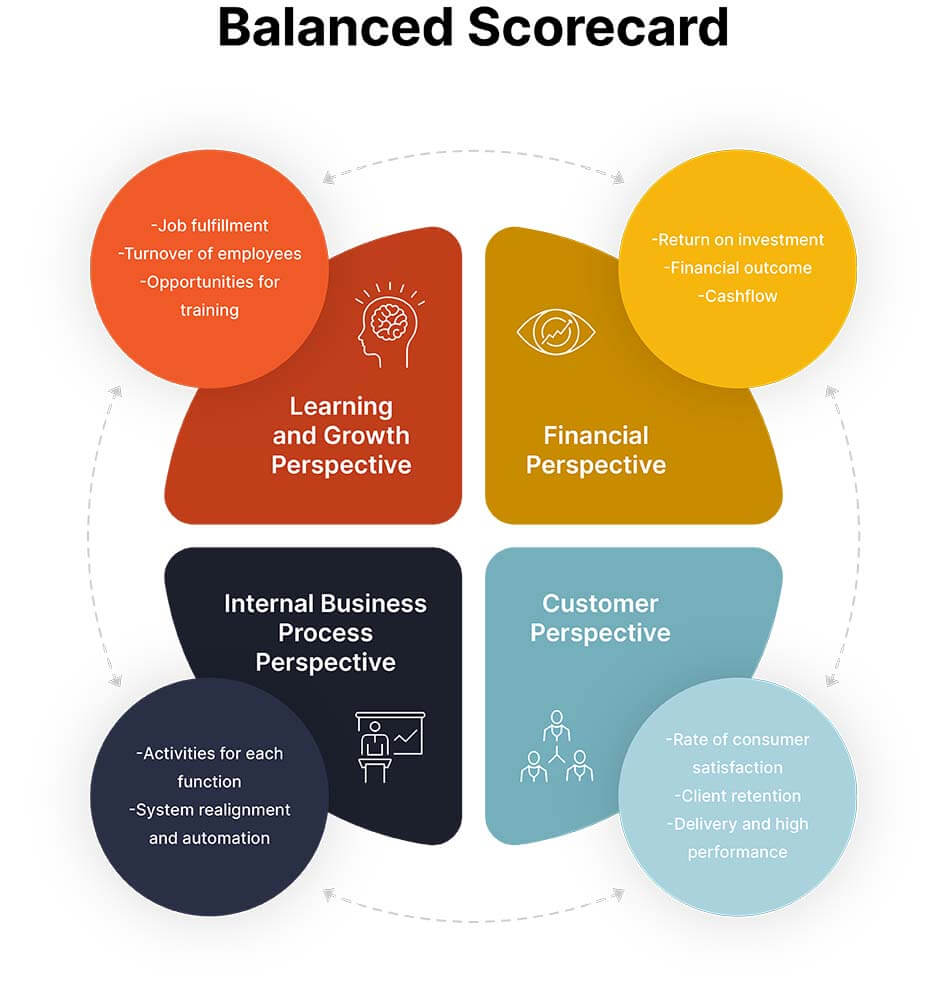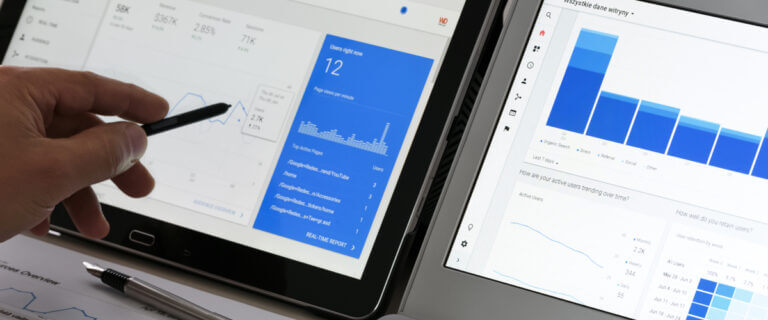If you’re in the business world, you probably understand that stagnation is death. As soon as you stop improving, you start dying.
Because of this, I’m constantly on the lookout for ways to run my business better. I’m talking about new management strategies, new decision-making techniques, and any way to improve efficiency. The bottom line is that if it gives a business an edge, I’m intrigued by it.
Balanced scorecards
Listen to Rodney talk about the importance of making data-informed improvements.
@connectivewebdesign Creating scorecards for marketing, entire company and individual roles. #eos #traction #kpi #scalingbusiness ♬ original sound – Rodney Warner
That’s why I was so happy to discover BSCs. A BSC, or balanced scorecard, is a handy little tool that has a big impact on business. With it, you can gather data, communicate better, and track progress in an entirely new way.
All of these factors make BSCs a powerful management tool. I believe that mastering them is a key element of effectively running a business.
What are balanced scorecards?
Now, if you haven’t heard of balanced scorecards before, you may be a little confused. You’re probably thinking: “Rodney, is this just some gimmick that’s going to take up more of my time?” Relax — when used strategically, BSCs can actually save you time.
Balanced scorecards, or BSCs, are essentially just a system for both business planning and management. They are a new way of charting out what you want to do and looking back on what activities your business completed.
The scorecard itself consists of a list of goals and other relevant information. This includes some measurable BSC performance metrics.
Think of it like an advanced version of a checklist. Working through it shows you what you should be doing and what others expect from you.
At the end of a job or a specific period of time, you fill the scorecard out. Management will provide ratings based on how things went. They’ll determine if you met your goals and, if not, how far off they were.
Then comes my favorite part. Management now has an objective and data-driven overview of that employee’s work. They can use this to inform the decision-making process going forward.
In many ways, balanced scorecards are like a rubric you’d receive for a college assignment. The rubric shows you exactly what you need to do for your assignment. Then, after the instructor grades it, it shows where you were successful and where you weren’t.
Scorecards at Connective
Now, you may be thinking that this sounds like a great hypothetical tool — emphasis on hypothetical. After all, business management strategies like these are plentiful, while ones that work are rare.
However, balanced scorecards aren’t just something we talk about at Connective. They are an operational tactic that we actually use.
I first learned about the concept of BSC (balanced scorecard) through the book “Traction” by Gino Wickman. This book talks about how to operate a business in an effective and scalable way. Overall, it is a fantastic book that I’d highly recommend to anyone who wants to learn more about business.
This book is where I found the balanced scorecard framework that I brought back to Connective. We used this framework to guide our implementation of BSCs and get the program started. Now, we use these scorecards regularly.
We use them primarily for insight. We use the data we derive from them to judge performance, guide management decisions, and even build budgets. This makes them helpful in nearly all aspects of guiding our company forward.
There, now you see that BSC strategy execution isn’t something that just exists in the minds of hopeful business planners. It is something that we actively use, and it’s something you can use too.
BSC for data
Now that you understand what BSCs are, we can dig into some of the benefits they provide.
One of the biggest benefits that BSCs provide is data. With scorecards, you are getting new pieces of data all the time.
If you’re thinking, “I already have enough data,” or “I keep receipts on all my sales; what more do I need to know?” then you need to pay attention.
First off, you can never have enough data, particularly good data. Good data lets you know what is going right and what is going wrong. BSCs provide you with plenty of good data on a regular basis.
Second, BSCs give you a new way to look at your data. Just pouring over receipts won’t tell you much about the bigger picture. Looking at what goals you met and how you met them will.
“Alright, you’ve convinced me,” you may now be thinking. “So, how does this all work?”
It starts with creating scorecards that call for measurable data. This could mean sales figures, marketing data, or the number of completed jobs. This will form a BSC measurement system.
This data then goes to management. They can take a look at what worked and what didn’t. Then, they’ll use this information to make decisions going forward.
This could influence many elements of the company. You should base decisions on future directions, resource allocation, budgets, and other important topics on the data you gather.
BSC for communication
I’m sure you’ve heard people say, “Communication is key” all the time. While they may be talking about making a relationship work, the same principle is true in business. Without communication, a business simply can’t function.
So, guess what the other big benefit provided by scorecards is? If you said communication, give yourself a pat on the back!
After you’ve taken the time to create it, a BSC (balanced scorecard) will list out goals, expectations, and more. One look at it will tell an employee exactly what management expects them to do.
It is here that communication is possible. By listing out goals, management can say, “Hey, this is what we’re expecting of you,” as clearly as they can.
“So what?” you may be wondering. “My managers tell my employees what to do all the time, and it never makes a difference.”
Unfortunately, not all communication is clear. Having a manager tell someone what to do is great if that employee has a flawless memory and isn’t prone to human error. However, it isn’t a perfect system otherwise.
BSCs help improve the way communication takes place. This one little thing has a number of positive features.
It prevents time waste from employees asking redundant questions and management answering them. After all, time is money.
It also eliminates ambiguity. When employees wonder what they need to do, they can just refer back to the scorecard. It doesn’t require any perfect memories.
It even provides more accountability. If employees claim they didn’t know what others expected them to do, management can point to the scorecard. This eliminates any “he said, she said” between parties.
BSC for progress
One more major benefit balanced scorecards provide is the ability to track progress. Since BSCs are timely and provide data at regular intervals, you can use them to follow progress within the company.
For example, imagine you have a huge project taking place. This project has a ton of different pieces that all need to come together properly, and it has a hard deadline.
With BSCs, you can see how far each step of the process has come. Each scorecard is like a mini-progress report that, together, gives a full picture of where things are. This allows you to make adjustments or changes as necessary.
However, this isn’t the only kind of progress you can track. You can also track the overall company growth and the progress of individuals.
Tracking overall company progress will involve tracking hard goals. These could be overall profits, number of sales, or any other important figure. This indicates the health of the company as a whole and shows if you’re heading in a good direction.
Tracking individuals will relate to what that individual does on a regular basis. This gives you a measurable view of their job performance.
Alternatively, you can also use scorecards to track the performance and progress of teams of people instead.
Using balanced scorecards
Now, with all of this information about the balanced scorecard methodology, you may think there is a pretty streamlined way to use them. “Just tell me what to do, and I’ll get started,” you may be thinking.
However, I can’t tell you exactly how to use balanced scorecards in your business. I can give you some advice and let you know what will be helpful. I just can’t get as specific as you might wish.
This is because BSC strategy implementation is highly individualized and will vary from company to company. What works at one business may not work at all somewhere else.
Take timing, for example. At Connective, I love the fact that balanced scorecards provide me with week-by-week updates on how things are going. However, a company with a slower pace may find weekly updates to be overwhelming and prefer a monthly approach.
Other factors are variable as well. Whether you use them to monitor individuals, groups, or the company as a whole, it makes a difference. Even the way management uses them could vary.
“So, how do I decide what is right for me?” You’ll need some careful consideration to answer this question.
First, make sure you fully understand the BSC, balanced scorecards. Know what they are and what they can do. Be realistic, and don’t expect them to suddenly solve all your problems.
Next, consider what you want to get out of them. Do you just want data about the projects you are working on, or are you looking to measure the effectiveness of different employees?
Finally, start building a system based on what works for you. This system should address your company’s specific situation.
As you work with it, don’t be afraid to change it up every now and then. The system doesn’t have to be rigid. If you see points of improvement, integrate them into future scorecards.
Challenges with scorecards
Alright, I just spent an entire article hyping up scorecards and talking about how great they are. With this in mind, you might be under the impression that I think they’re perfect.
Well, I don’t think balanced scorecards are perfect. I think these tools are fantastic, and I truly believe that they offer a ton of advantages that businesses can use. However, I can still recognize that they have some challenges.
The biggest challenge, in my opinion, comes from subjectivity. How do you provide feedback on a job that is subjective? How can you get numbers from something that doesn’t involve numbers?
It is easy to create data-driven scorecards for some employees. For example, you can judge a salesperson based on the number of sales they make or someone in SEO marketing based on the amount of traffic they bring in.
However, this isn’t possible in every case. For example, how do you judge the effectiveness of a graphic designer’s work? Can you really provide an objective rating for the impact of a logo they created?
A possible solution for this challenge may come from surveys. Coming back to the logo example, surveying customers about their feelings about the logo could provide some numbers for the graphic designer’s work.
However, even this has flaws. Surveys are prone to bias. Plus, they can be expensive to run and difficult to do on a regular basis.
This challenge is something our company has struggled with and has yet to develop a solution for. As the idea of scorecards develops further, we’re interested in seeing if others find a way to tackle this problem.
Who knows, you may be the one to come up with the solution that will address this challenge. Just make sure to let me know if you do!
Conclusion
So, what do you think? Are you intrigued by the idea of using a BSC, balanced scorecard, to help run and improve your business? Do you think you’ll implement them in the future?
If you’re anything like me, I know you’ll at least look into the possibilities. At this point, you’ve got a basic overview of what they are and may even be starting to see their potential. From that point, it’s up to you to see what value you can actually get from this innovative system. Good luck!















